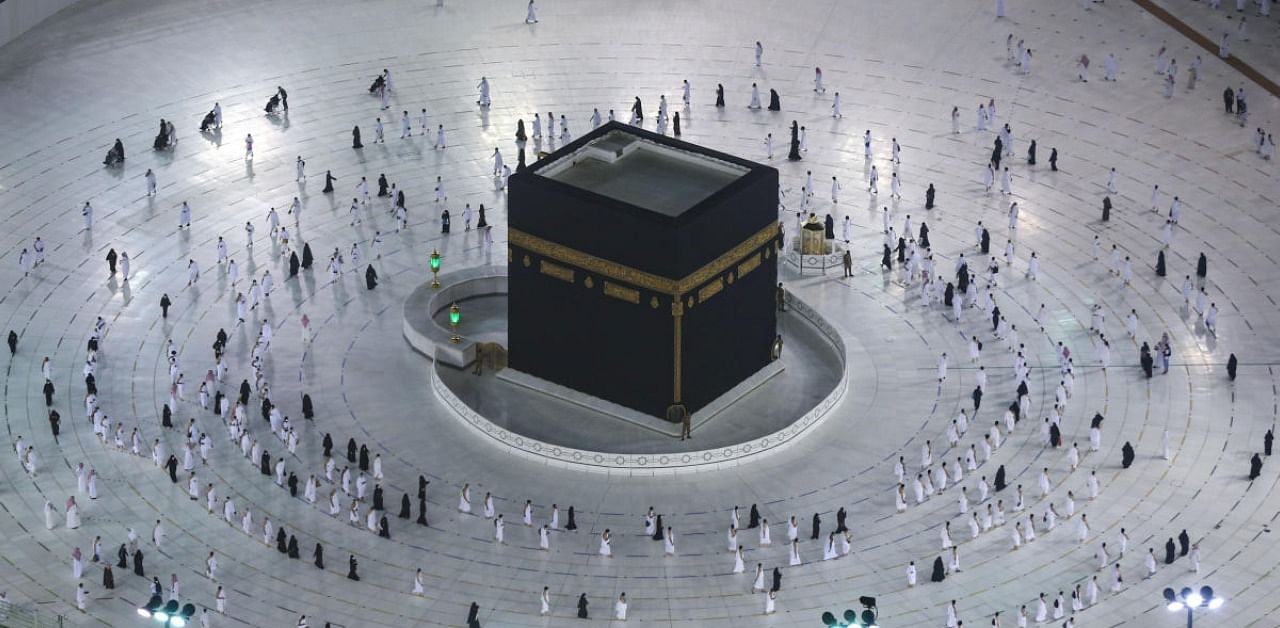
Mask-clad Muslims circled Islam's holiest site along socially distanced paths on Sunday, as Saudi authorities partially resumed the year-round umrah pilgrimage with extensive health precautions adopted after a seven-month coronavirus hiatus.
Thousands of worshippers entered the Grand Mosque in the holy city of Mecca in batches to perform the ritual of circling the sacred Kaaba, a cubic structure towards which Muslims around the world pray.
The umrah, the pilgrimage that can be undertaken at any time, usually attracts millions of Muslims from across the globe each year but it was suspended in March due to the coronavirus pandemic.
It will be revived in three phases, with Saudi Hajj Minister Mohammad Benten saying last week that 6,000 pilgrims per day will be allowed in the first stage to perform the umrah "meticulously and within a specified period of time".
A raft of precautions have been adopted to ward off any outbreaks, according to state media.
The revered Black Stone in the eastern corner of the Kaaba -- which it is customary but not mandatory to touch during the pilgrimage -- will be out of reach, and the Grand Mosque is to be sterilised before and after each group of worshippers.
Each group of 20 or 25 pilgrims are to be accompanied by a health worker and medical teams will be on the ground in case of an emergency, Benten said.
"In an atmosphere of faith and with assured hearts... the first batch of pilgrims begin the pilgrimage in accordance with the precautionary measures laid out," the hajj ministry said on Twitter.
Under the second stage from October 18, the number of umrah pilgrims will be increased to 15,000 per day.
Visitors from abroad will be permitted in the third stage from November 1, when capacity will be raised to 20,000.
A maximum of 40,000 people, including other worshippers, will be allowed to perform prayers at the mosque in the second stage and 60,000 in the third, according to the interior ministry.
The decision to resume the pilgrimage was taken in response to the "aspirations of Muslims home and abroad" to perform the ritual and visit the holy sites, the ministry said last month.
It said the umrah will be allowed to return to full capacity once the threat of the pandemic has abated.
Until then, the health ministry will vet countries from which pilgrims are allowed to enter based on the health risks.
Saudi Arabia suspended the umrah in March and scaled back the annual hajj pilgrimage over fears the coronavirus could spread to Islam's holiest cities and back to pilgrims' home countries.
The hajj went ahead in late July, on the smallest scale in modern history, with only up to 10,000 Muslim residents of the country allowed to take part -- a far cry from the 2.5 million who participated last year.
Health authorities said no coronavirus cases were reported at the holy sites during the hajj, one of the five pillars of Islam and a must for able-bodied Muslims at least once in their lifetime.
The pilgrimages are a massive logistical challenge, with colossal crowds cramming into relatively small holy sites, making them vulnerable to contagion.
Saudi Arabia's custodianship of Mecca and Medina -- Islam's two holiest sites -- is seen as its most powerful source of political legitimacy.
The holy sites are also a key revenue earner for the kingdom, whose economy has been badly hit by a coronavirus-driven collapse in the global demand for oil.
Saudi Arabia has had more than 335,000 confirmed cases of the virus and 4,850 deaths.